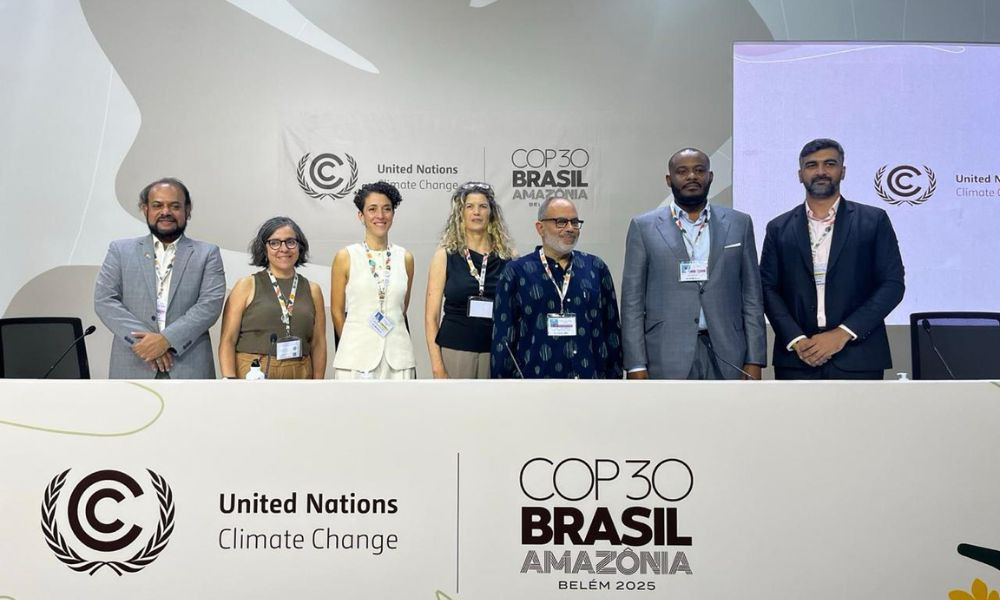02/25/2026

BD seeks urgent adaptation finance at COP30
Diplomatic Correspondent | Published: 2025-11-14 17:07:20

Bangladesh has raised concerns over a widening gap between the health adaptation support it needs and what it actually receives from international sources, warning that the country’s ability to protect people from climate-related health risks is under severe strain.
Md Ziaul Haque, additional director general of the Department of Environment and a member of Bangladesh’s delegation to COP30, made the remarks at a press conference in Belém, Brazil, on Friday (14 November) on the occasion of Health Day at COP30.
The press conference, titled “Putting Health at the Centre of Adaptation Finance,” was jointly organised by Regions4, the Global Climate and Health Alliance, and Carbon Copy.
Speaking at the event, Ziaul Haque urged the international community to honor its climate finance commitments to Bangladesh to help tackle this pressing crisis.
“Our Health National Adaptation Plan was designed to identify real problems, build capacity, and use our limited resources more effectively,” he said. “But the truth is, our adaptation financing for health is far below what is needed. The gap between what we require and what we receive is enormous.”
He added that although health has been on the COP agenda since 2013, progress has been slow.” Ziaul Haque called on multilateral funding agencies to bring forward concrete, holistic proposals that match the scale of the challenge.
Global health and climate experts at the conference emphasized that climate change is emerging as one of the greatest threats to human health, with health systems worldwide under increasing strain and largely unprepared for the escalating crisis.
Dr. Marina Romanello, executive director of the Lancet Countdown, said, “Each year, more than half a million people die worldwide due to extreme heat, and over 150,000 deaths are linked to wildfire smoke exposure. Health systems are already stretched and underfunded, and most countries are not yet prepared for what is coming.”
She added that only 44 percent of countries have costed their health adaptation needs, leaving a multibillion-dollar global financing gap.
Representatives from Chile, Nigeria, India, and the COP30 Presidency highlighted that the crisis in health financing reflects a much larger global shortfall in overall adaptation funding.
According to the 2025 Adaptation Gap Report, developing countries will require $310–365 billion annually by 2035 to cope with climate impacts. Yet the global community is still struggling to mobilize even the $40 billion pledged under the Glasgow Pact.
Carlos Lopes, COP30 Presidency’s Special Envoy for Africa, said, “The deficit in health financing is colossal. Most efforts are being financed domestically. International support must be complementary and scaled up significantly.”
UNEP data shows that only 4 percent of multilateral adaptation finance between 2019 and 2023 went to health, while a separate study by adelphi found that just 0.5 percent of all multilateral climate finance supports health-related initiatives.
The latest Lancet Countdown Report, released last month, highlights a sharp rise in climate-related deaths. Extreme heat, floods, erratic rainfall, storms, and desertification are putting unprecedented pressure on communities and health services worldwide.
In this context, world leaders have gathered in Belém, often called both the “Adaptation COP” and the “Implementation COP,” with expectations of tangible progress, particularly in the health sector.
Representatives from India and Nigeria emphasised the urgency of increasing investment. Dr Vishwas Chitale, Fellow at the Council for Energy, Environment & Water, India, and Research Fellow at the United Nations, said India will need $643 billion for adaptation by 2030. Oden Ewa from Nigeria reported that in 2021–22, adaptation finance covered only 6 percent of Nigeria’s health sector needs, despite rising disease burdens due to extreme heat and heavy rainfall.
Speakers welcomed the newly formed Climate and Health Funders Coalition, which has pledged $300 million, but experts warned that significantly larger investments will be required.
“Protecting health must be at the center of climate adaptation,” said Jeni Miller, Executive Director of the Global Climate and Health Alliance. “The world is only beginning to recognise this importance.”
Editor & Publisher : Md. Motiur Rahman
Pritam-Zaman Tower, Level 03, Suite No: 401/A, 37/2 Bir Protik Gazi Dastagir Road, Purana Palton, Dhaka-1000
Cell : (+88) 01706 666 716, (+88) 01711 145 898, Phone: +88 02-41051180-81